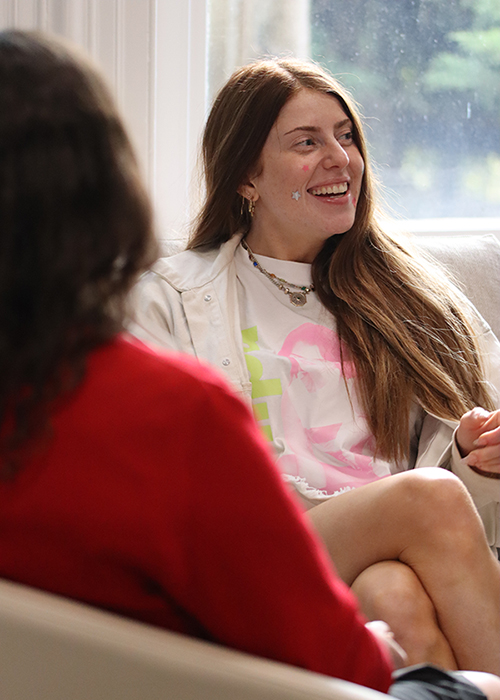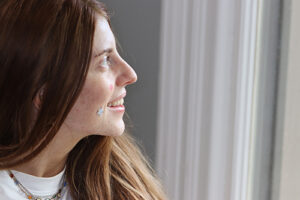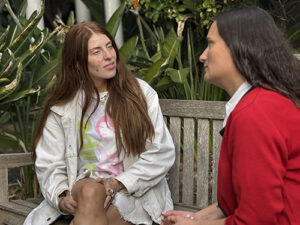Helping neurodivergent women to drop their masks
22/10/2025

Drama queen. Attention seeker. Too sensitive. Emotions too big. Emily has spent her lifetime hearing herself described as all of those things. But it’s only now, following an ADHD and Autism Assessment and intervention at the Cabrini Women’s Mental Health Centre, that Emily and her big emotions have been validated.
Six months ago, after years of trying to suppress her real self, Emily made the decision to be assessed for neurodivergence, as the 27-year-old had long believed she didn’t quite fit into the world around her.
“I was always very ‘extra’, high energy, bullied a lot and picked on, struggled to make friends, then would have lots of friends. I couldn’t stay still, and my dance teachers would say ‘just one spin, Emily’ and I’d be doing seven,” she laughed.
“And I was always hearing, ‘she has potential if she just applies herself more’, but I couldn’t focus and always wanted to do a million things.”
They were common features of Emily’s day, and those of many neurodivergent women.
“I grew up being told I was over-sensitive, and I’ve always been called a drama queen, and I would just feel things so intensely – I still do,” Emily shared. “And then as I got older, I had this intense overwhelm of emotions and was feeling quite discombobulated all the time. I felt as though I wanted so badly to gain control over my life but there were tools that I was lacking.”
Emily learned about the newly launched HER Neurodivergence Centre at the Cabrini Lisa Thurin Women’s Mental Health Centre in Elsternwick, where women could undertake Australia’s first ADHD and Autism Assessment designed for women. She signed up for a two-week inpatient stay, incorporating the assessment into the program, learning the tools to help live with the diagnosis she received during her stay. Post-program, she followed up as an outpatient to the Living Well with ADHD program.
“I’ve spent my life missing social cues, which I now understand, and I’d engaged in risky behaviours, and I was just losing myself, living in this kind of loop,” Emily said. “I figured there was something else going on and just needed some me-time to lock in and get a diagnosis and really tune into myself.
“Cabrini was exactly what I needed. I trusted in it, and it felt so right. I knew it’d be hard, but I also knew it was going to be such an amazing help, and I was right. It was phenomenal and I got so much out of it. They made me feel so safe and I walked out with tools and a diagnosis that was truly life-changing and validating.”

Since the opening of the women-only Centre in 2021, about half of all patients participating in the Centre’s programs had either been diagnosed with or had been seeking assessment for ADHD or autism. The demand prompted the establishment of the neurodivergence centre within the Cabrini facility, designed specifically for women.
Diagnostic assessments are completed by Cabrini’s clinical neuropsychologists and are conducted during an inpatient stay at the Centre or as an outpatient. Assessment provides women like Emily with not only an accurate diagnosis of their neurodivergence, but validation, an understanding of their brain-type, and freedom to drop the mask that so many neurodivergent women put up to exist on a daily basis.
Clients are then given the tools they need to help them thrive in a predominantly neurotypical world.
“When you’re born with a neurodivergent brain, but you don’t know it and you’re trying to fit in a typical world and meet others’ expectations with a brain that is constantly giving, and then not having that validation, and working against yourself instead of with yourself, it’s very challenging,” Cabrini clinical neuropsychologist Carolina Restrepo said.
“So, it’s important to understand what type of brain you have and to work with your brain and learn what the needs of your brain are. Getting that right can open a whole range of opportunities. And that’s where a diagnosis helps.”
Neuropsychologist Olivia Mazzone, who performs assessments at the Centre, said a lot of the women she sees might have collected labels like Emily’s along the way, but for others, they have simply observed that life just doesn’t seem to be working.
“For some, they feel like something hasn’t quite clicked and they’re wondering what it is that hasn’t been working for them,” she said. “So, a lot of women are just seeking those answers, and it just comes from a place of curiosity and wanting to learn more about themselves.
“Being a women’s service, we focus on that, and we know that women internalise a lot of their challenges, and so their issues can sometimes be overlooked or unfortunately dismissed.
“That’s why it can be so important for them to have a formal diagnosis and to hear that they do have a different brain, and the way that they’re experiencing the world is just how their brain is processing things a little bit differently. Importantly, it’s knowing that it is just a difference, and it’s not something that needs to be changed or fixed. It’s about working out what’s going to work for you day to day, and understanding what you might need, and how you can change your environment to support you.”
Many women find themselves seeking ADHD or autism assessments at significant life stages, Olivia said.

“Quite often, it’s in those periods of transition where the wheels can kind of fall off a little bit more,” she said. “So, we often see during that adolescent period that girls might be struggling to get through VCE or make it through school. And similarly, it might be moving out of home or starting to go through perimenopause. All of those phases when the demands start to increase on them are significant.
“Neurodivergent women are often excellent maskers, and they’ve been holding it together, but it gets to the point where one more thing is added to their plate, and it’s just too much.”
The Cabrini Women’s Mental Health Centre has been adapted to be neuro-affirming, with dimmable lights, fidget toys, and communal and private spaces to accommodate every woman’s needs during their stay. Significantly, the camaraderie, support and understanding from the other female clients who are on a similar journey also contribute to the program’s success.
As too are the day programs, including the Living Well with ADHD group program, which has helped Emily “in so many ways” to live better and thrive as a neurodivergent person in a neurotypical world.
“I really feel as though this can save lives,” she said. “It definitely saved mine. “I think if I’d known what I’ve now learned a long time ago, I wouldn’t have made so many mistakes and ended up in so many of the wrong places. Mistakes are beautiful, because we do the best we can at the time with the tools we have. But I know now that the Emily I was supposed to be has finally arrived because of my diagnosis.”
Learn more about Cabrini’s Lisa Thurin Women’s Health Centre